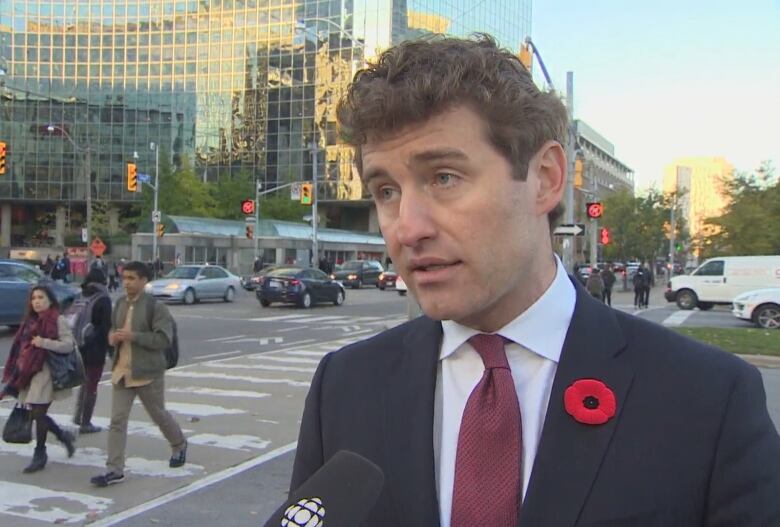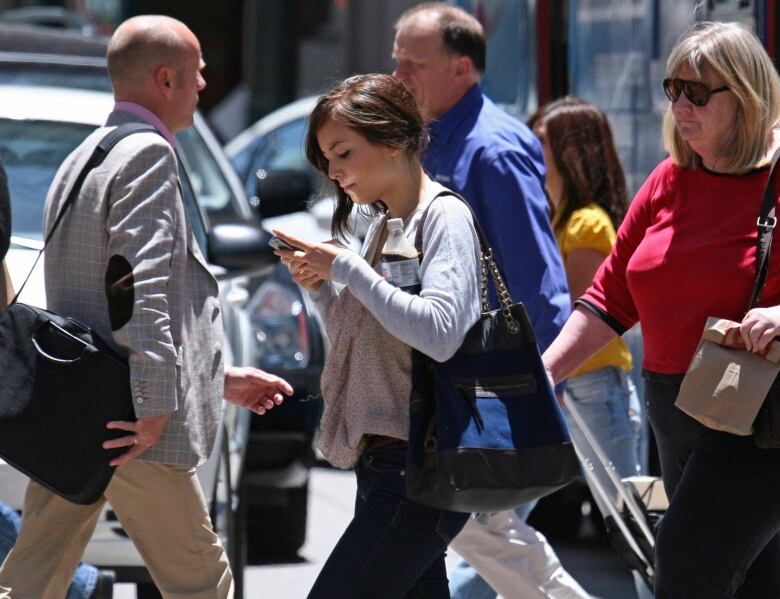Ontario MPP proposes law to fine distracted pedestrians
Critics argue so-called 'zombie laws' unfairly put the onus on pedestrians instead of drivers

A new private member's bill that would see distracted pedestrians fined up to $50 for crossing the road while using their smartphones was unveiled at Ontario's Legislature on Monday.
The "Phones Down, Heads Up Act" will be introduced by Toronto MPP Yvan Baker, with a debate set for next March.The representative for Etobicoke Centre, in the city's west end, said he was prompted to draft the legislation after his constituents raised concerns about the number of pedestrian deaths in Toronto.
In 2016, 42 pedestrians were killed on the city's streets, the most since 2002.
Baker's bill would ban people from looking at their phones or electronic devices when crossing roads, with an initial $50 fine for the first offence, $75 for the second and up to $125 for the third. Exceptions would includepedestrians making an emergency call or if they began speaking on the phone before stepping into the crosswalk.
"These fines are modest and are meant to act as a deterrent," Baker said during a news conference Monday morning. He was joined by Brian Patterson, chief executive of the Ontario Safety League, a group whose work includes pedestrian advocacy. The organization is endorsing the bill.
The legislation would also mandate a ministry of transportation-led annual distracting driving awareness campaign, with a focus on texting and driving.
"This bill is about raising awareness about risky behaviour because limiting that behaviour will save lives," Baker said.

A 2015 reportby Toronto Public Health that examined pedestrian and cyclist deaths in the city from 2008-2012 found that "inattentive" pedestrians were about 40 per centmore likely to be injured or killed in a collision with a vehicle. The same study also concluded that in the majority of collisions that wereexamined, the pedestrian was crossing at a green light and therefore had the right of way.
Critics of so-called 'zombie laws' (think zombies walking aimlessly in search of human flesh) argue that they put the onus on pedestrians instead of drivers, despite the fact that distracted driving isthe number one cause of deaths on the province's roadways. In Ontario last year, provincial police attributed 65 deaths to distracted driving, more than those caused by drunk driving, speeding or not wearing a seatbelt.
"There is no question that there is a problem with distracted driving in this province, and I am not minimizing that," Baker said, adding that that was the impetus to include an annual awareness campaign as part of the proposed legislation.
"The focus of this bill is not to point a finger at either pedestrians or drivers," Baker said.
Patterson said he is concerned about a growing misconception among some that pedestrians always have a right of way.
"The reality is that you can cross when it's safe to do so. The obligation is on both parties to make sure it is safe to do so," he told reporters after questions about whether fines for pedestrians would make streets more safe.
"We have to go old school and educate people."

The bill was not drafted with direct support or input from the province's minister of transportation, according to Baker, though in a media scrum Premier Kathleen Wynne said the legislation was an interesting idea.
Advocacy groups have also pointed to the fact that historically, law enforcement has been accused of using traffic laws in unintended ways to police and gather information in racialized communities. One such example is jaywalking, a bylaw that some say can be selectively enforced without much accountability by police forces.
Baker admitted his proposed law would be difficult to enforce and that individual municipalities will be able to opt out of enforcement all together. Rather, his bill would simply "give police another tool to alert pedestrians to the risk of crossing the road while being distracted by their smartphone."
Private member's bills are rarely passed into law. After debate in March, the billwould still have to make it through a committee hearing before passage in the Legislature. With a provincial election scheduled for June 7, 2018, it's highly unlikely the legislation would be made law before the assembly is dissolved for the election campaign.












_(720p).jpg)


 OFFICIAL HD MUSIC VIDEO.jpg)
.jpg)



























































































